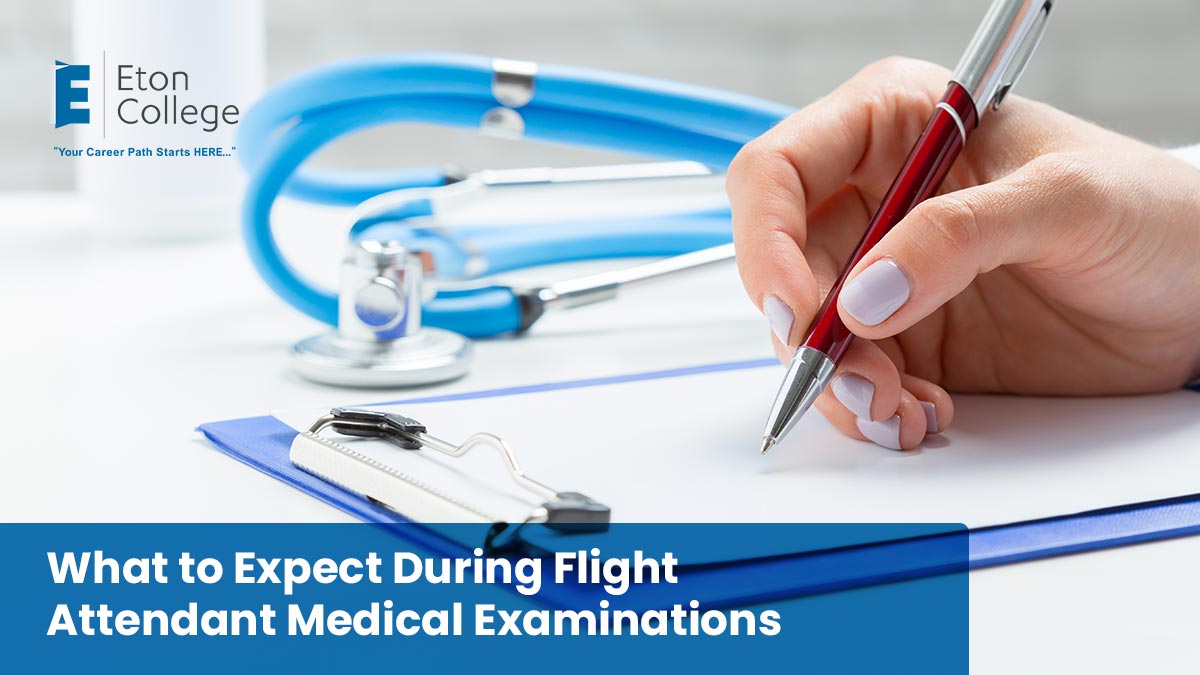Key Takeaways:
- Flight Attendant Medical Examinations cover vision, hearing, physical fitness, mental health, and drug screening.
- Airlines require candidates to meet specific height and arm-reach standards.
- Immunizations and swimming proficiency may be part of the assessment.
Pursuing a career as a flight attendant is thrilling, but it comes with responsibilities—especially when it comes to health. Airlines prioritize safety, so candidates must pass rigorous Flight Attendant Medical Examinations to ensure they are physically fit to manage onboard emergencies. If you’re planning to embark on this exciting journey, understanding what to expect during these exams will help you feel prepared and confident.
Airlines assess a range of factors, from vision and cardiovascular health to mental resilience, ensuring that candidates can meet industry requirements. If you’re preparing for these exams, it’s important to understand what to expect at each stage. Being familiar with the process can ease your nerves and boost your confidence as you move one step closer to achieving your dream of becoming a flight attendant.
1. Vision and Hearing Tests
Airlines need to ensure their crew can communicate clearly and react swiftly in emergencies. During medical examinations:
- Vision Tests will assess if you can read safety instructions, recognize symbols, and see well both up close and at a distance. Corrective lenses are acceptable, but your vision must meet airline standards.
- Hearing Tests evaluate your ability to hear in-flight announcements and respond to passenger needs amid noisy environments.
Good eyesight and hearing are essential to performing safety-related tasks effectively, such as spotting exit signs and following instructions from the cockpit.
2. Height and Reach Requirements
Flight attendants need to access overhead compartments and safety equipment with ease. Medical exams may include assessments of:
- Height and Arm Reach: Most airlines require candidates to meet a specific arm-reach standard (often around 212 cm). This ensures you can operate equipment, assist passengers, and perform safety procedures without difficulty.
- Some airlines also set minimum or maximum height requirements to maintain uniform cabin operations.
3. Cardiovascular Health and Physical Fitness
Flight attendants must be able to stand for long periods, lift heavy luggage, and assist passengers in emergencies. To ensure fitness, the medical exam may involve:
- Blood Pressure and Heart Rate Monitoring to confirm you’re fit for active duties.
- Exercise Tolerance Tests, such as treadmill stress tests, to gauge your ability to handle physical strain.
Airlines want to ensure candidates can manage the physical demands of the job without compromising safety.
4. Drug Screening and Medical History Review
Safety and reliability are paramount in aviation. Airlines conduct drug tests to ensure candidates are free from substances that could impair performance. Additionally, medical professionals will:
- Review Your Medical History to check for any chronic conditions or past illnesses that could interfere with your duties.
- Candidates must disclose any medications they take and ensure those medications do not conflict with the airline’s safety policies.
5. Mental Health Assessment
Flight attendants handle high-pressure situations, from managing in-flight turbulence to resolving passenger conflicts. Mental health assessments help ensure that candidates can remain calm, think critically, and respond to emergencies. You may be evaluated for:
- Stress Management Skills and emotional stability under challenging conditions.
- Airlines want to ensure crew members can provide outstanding service while staying composed during crises.
How Eton College Prepares You for Success
Navigating the medical examination process can seem overwhelming, but that’s where Eton College’s Flight Attendant Preparation Program makes a difference. This 14-week program equips students with the skills and knowledge they need to meet airline standards—both physically and mentally.
Through hands-on training, mentorship from industry experts, and real-world simulations, students gain the tools to build physical endurance and emotional resilience. The program includes essential certifications like First Aid and CPR to meet safety requirements and offers mock assessments to help students feel confident during the medical evaluation process.
Graduates of Eton College are well-prepared to handle every stage of the hiring process, from Flight Attendant Medical Examinations to final interviews. With the program’s strong industry connections, students also benefit from job placement assistance to kick-start their aviation careers.
6. Immunizations and Travel Readiness
Since flight attendants travel internationally, airlines may require proof of certain immunizations to comply with global health regulations. Vaccinations for diseases such as yellow fever or hepatitis may be mandatory, depending on the destinations served.
Being prepared with an updated vaccination record ensures that you are ready to fly anywhere your career takes you.
7. Ability to Swim and Perform Safety Drills
Some airlines require flight attendants to demonstrate swimming proficiency during medical assessments. As a crew member, you may be responsible for assisting passengers in water landings, so being able to swim unaided is crucial. Candidates might also need to practice:
- Life jacket operation and water evacuation drills.
- These practical tests ensure you’re prepared to perform your duties confidently, even in emergency situations.
Be Ready for Every Challenge
Passing a medical examination requires more than just meeting physical requirements—it involves demonstrating mental resilience, problem-solving skills, and readiness to manage emergencies. The process may feel challenging, but with the right preparation, you can excel.
Eton College’s Flight Attendant Preparation Program is designed to give you an edge throughout the hiring process. From building physical fitness to mastering safety certifications, Eton ensures you’re fully equipped to meet airline requirements and thrive in your aviation career.
Your journey to becoming a flight attendant starts with proper preparation. With Eton College by your side, you’ll be ready to pass every test with flying colors.
FAQ:
- Q: Do all airlines have the same medical requirements for flight attendants?
A: While the basic requirements are similar, some airlines may have additional criteria, such as specific height ranges or stricter medical standards. - Q: Can I still apply if I wear glasses or contact lenses?
A: Yes, most airlines allow corrective lenses, as long as your vision meets the required standard with them. - Q: How long does the flight attendant medical examination take?
A: The duration varies, but the full process can take a few hours, including medical history review, tests, and physical assessments. - Q: What certifications do I need to pass the medical examination?
A: Basic certifications like First Aid and CPR are often required. Eton College’s Flight Attendant Preparation Program ensures students earn these certifications before applying.




